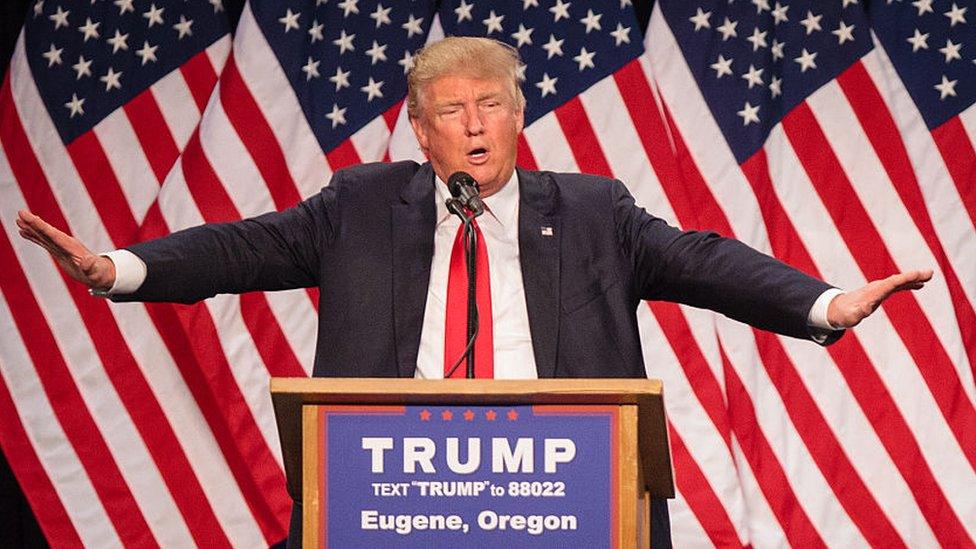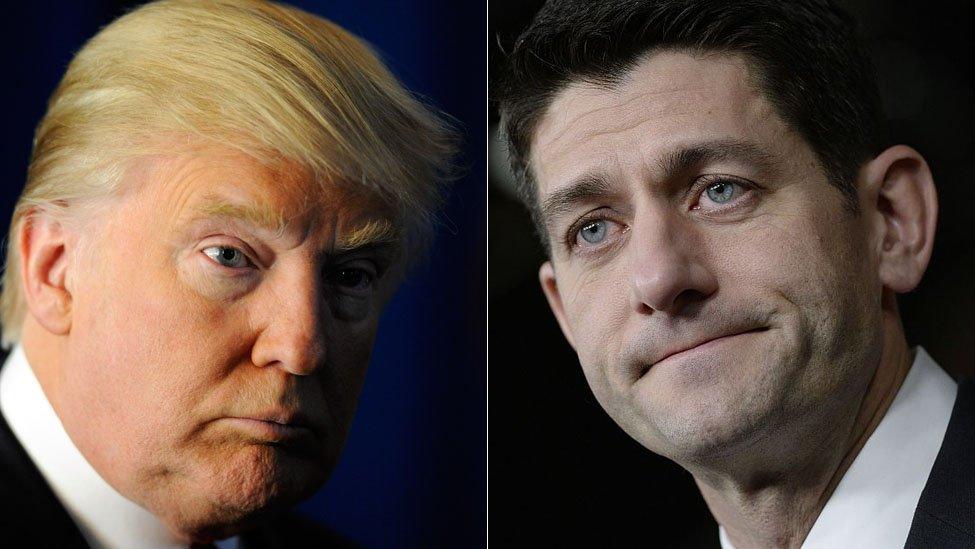US Election 2016: Donald Trump softens stance on Muslim ban
- Published

Mr Trump now calls the Muslim ban "a suggestion"
Republican presidential candidate Donald Trump appears to have softened his stance on temporarily barring Muslims from travelling to the US.
Responding to remarks by London Mayor Sadiq Khan, Mr Trump told Fox News Radio the ban was "just a suggestion".
Mr Khan has expressed concern that he would not be able to travel to the US under a Trump administration because of his Muslim faith.
Mr Trump had offered to make an "exception" for Mr Khan.
Mr Khan refused Mr Trump's offer, saying the New York businessman's views were "ignorant" and would make the UK and the US "less safe".
Mr Trump proposed a ban on Muslims entering the US after attacks in Paris killed 130 people last year.
Sadiq Khan: I won't be Donald Trump's Muslim 'exception'
The suggested ban has been widely criticised in the US and abroad but Mr Trump until now has stood by the proposal, saying it was needed to ensure US security.
"It's a temporary ban. It hasn't been called for yet," Mr Trump said on Wednesday. "This is just a suggestion until we find out what's going on."
Mr Trump has shifted positions in the past on a variety of issues only to change his stance days later.

Analysis: Anthony Zurcher, BBC North America reporter

House Speaker Paul Ryan (right) says he is not ready to support Donald Trump's bid for presidency
It's likely no coincidence that Donald Trump has softened the rhetoric surrounding his call for a sweeping ban on Muslim immigration into the US on the eve of his closely watched Washington meeting with House Speaker Paul Ryan.
When Mr Trump first unveiled his proposal, Mr Ryan's response was short and sharp.
"This is not conservatism," he said.
At the time Mr Ryan's voice was just one of many in the Republican establishment condemning what seemed an extremely controversial proposal from the New York businessman.
Now Mr Trump is the presumptive nominee, and that Republican establishment has been moving - grudgingly - toward backing their new standard-bearer. Mr Ryan has been a holdout, however, saying he wants evidence that Mr Trump shares conservative values and principles.
Mr Trump's latest rhetorical swivel could be an olive branch to the speaker - and, perhaps, a fig leaf allowing Mr Ryan to eventually offer his support.

He has often given conflicting accounts on issues including his tax plan, abortion and transgender people accessing public toilets.
This flexibility has led to concerns among Republican Party leaders about his candidacy.
Top Republicans including House Speaker Paul Ryan have said they are not ready to support Mr Trump in the general election.
Mr Trump will meet Senator Majority Leader Mitch McConnell, Mr Ryan and others on Thursday in an attempt to resolve differences.
Also on Wednesday, Democratic presidential candidate Hillary Clinton and Mitt Romney - who ran against President Barack Obama in 2012 - separately raised questions about Mr Trump's tax returns.
Mr Trump has so far refused to release his tax records - a common practice among presidential nominees. Mrs Clinton has posted her past eight tax returns, external on her website.
"It is disqualifying for a modern-day presidential nominee to refuse to release tax returns to the voters, especially one who has not been subject to public scrutiny in either military or public service," Mr Romney said, external.